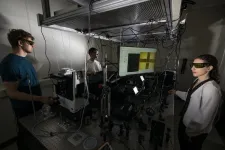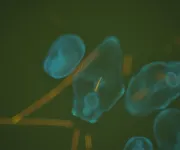(Press-News.org) Mindfulness training may lead participants to experience disembodiment and unity – so-called altered states of consciousness – according to a new study from researchers at the University of Cambridge.
The team say that while these experiences can be very positive, that is not always the case. Mindfulness teachers and students need to be aware that they can be a side-effect of training, and students should feel empowered to share their experiences with their teacher or doctor if they have any concerns.
Mindfulness-based programmes have become very popular in recent years. According to recent surveys, 15% of adults in the UK have learnt some form of mindfulness. They are often practised as a way of reducing stress or coping with depression and anxiety. There is anecdotal evidence that practising mindfulness can lead to alterations of the senses, self, and body boundaries, some even similar to those induced by psychotropic drugs.
From September 2015 to January 2016, the University of Cambridge conducted a randomised controlled trial to assess the effectiveness of mindfulness training as a way of coping with the stress of examinations and found that it can help support students at risk of mental health problems.
Dr Julieta Galante from the Department of Psychiatry at the University of Cambridge, who led the trial, said: “There’s been anecdotal evidence that people who practice mindfulness experience changes in how they perceive themselves and the world around them, but it’s difficult to know whether these experiences are a result of mindfulness practice or whether people who are more prone to such experiences are also more likely to practise mindfulness.
“Because we’d been running a randomised trial of mindfulness practice with several hundred students at Cambridge, we realised this offered us an opportunity to explore this question further.”
The team behind the trial followed up with participants a year later to investigate whether they had experienced any of the altered states of consciousness being reported anecdotally. The results are published today in PLOS ONE.
Participants were asked to complete a questionnaire that explored 11 ‘dimensions’ such as: spiritual experience; blissful state; disembodiment; and unity. In experiences of unity there is a sense that borders dissolve and everything, sometimes including the sense of time, is perceived in an integrated way. Disembodiment experiences often consist of a floating sensation or a dissolution of body boundaries, which may facilitate strong unity experiences.
In total, 670 participants took part in the randomised trial. Around a third each from the mindfulness trial and the control arm went on to complete the questionnaire about experiences of altered states of consciousness.
The researchers found that people who had received the mindfulness training were twice as likely as those in the control group to experience unity and disembodiment.
When the researchers explored the relationship between the total hours of formal mindfulness practice and the presence and intensity of experiences of altered states of consciousness, they found that the more people practised, the more likely they were to have an experience of unity, disembodiment, or of a blissful state.
Participants who reported having meditated in the six months prior were asked if altered states of consciousness happened during meditation. Based on this sub-sample of 73 participants, 43% reported unity experiences during meditation, 47% blissful states, 29% disembodiment experiences, and 25% insightfulness experiences.
Dr Galante said: “Although we can’t say definitively, our results at least suggest the possibility that mindfulness training causes these experiences of unity and disembodiment. It aligns with other studies showing that people who practice mindfulness training are more likely to describe experiencing a sense of relaxed self-boundaries and broadening their spatial awareness beyond the physical body.”
Dr Galante, who practices mindfulness, has herself experienced these altered states of consciousness.
“I’ve benefited a lot personally from meditation and mindfulness and I’ve also had many of these experiences,” she said. “They were intense, and at first I found it difficult to share them with my meditation teacher. I didn’t know if they were normal or desirable or if they were a sign of problems with my mental health.”
While many experiences of altered states of consciousness are likely to be interpreted as pleasant, this may not always be the case, and Dr Galante says that it is important for teachers and their students to be aware that they may arise and be open to talking about them.
She added: “The most common and intense experiences tend to be those that do not have intrinsically unpleasant characteristics. Some, such as bliss, can feel extremely pleasant. But some experiences, such as disembodiment or altered sense of self could be perceived as unpleasant, or startling, even alarming, especially if you’re not expecting them.
“It’s important that people who are offered mindfulness are told about the possibility that they may come across these experiences. That way, if they do experience them, they shouldn’t be disconcerted. There may be nothing wrong with their experience, but it may be useful for them to check in with their mindfulness teacher, and if the experience was negative, to also consider discussing it with their doctor.”
The research was supported by the University of Cambridge Vice-Chancellor’s Endowment Fund, the University Counselling Service and the National Institute for Health Research (NIHR) Applied Research Collaboration East of England programme.
Reference
Galante, J & Montero-Marin, J et al. Altered states of consciousness caused by a mindfulness-based programme up to a year later: results from a randomised controlled trial. PLOS ONE; 17 July 2024; DOI: 10.1371/journal.pone.0305928
END
Mindfulness training may lead to altered states of consciousness, study finds
2024-07-17
ELSE PRESS RELEASES FROM THIS DATE:
New technique pinpoints nanoscale ‘hot spots’ in electronics to improve their longevity
2024-07-17
When electronic devices like laptops or smartphones overheat, they are fundamentally suffering from a nanoscale heat transfer problem. Pinpointing the source of that problem can be like trying to find a needle in a haystack.
“The building blocks of our modern electronics are transistors with nanoscale features, so to understand which parts of overheating, the first step is to get a detailed temperature map,” says Andrea Pickel, an assistant professor from the University of Rochester’s Department of Mechanical Engineering. “But you need something with nanoscale ...
Study shows ancient viruses fuel modern-day cancers
2024-07-17
Peek inside the human genome and, among the 20,000 or so genes that serve as building blocks of life, you’ll also find flecks of DNA left behind by viruses that infected primate ancestors tens of millions of years ago.
These ancient hitchhikers, known as endogenous retroviruses, were long considered inert or ‘junk’ DNA, defanged of any ability to do damage. New CU Boulder research published July 17 in the journal Science Advances shows that, when reawakened, they can play a critical role in helping cancer survive and thrive. The study also suggests that silencing certain endogenous retroviruses can make cancer treatments work better.
“Our study shows that diseases ...
Reef pest feasts on 'sea sawdust'
2024-07-17
Researchers have uncovered an under-the-sea phenomenon where coral-destroying crown-of-thorns starfish larvae have been feasting on blue-green algae bacteria known as ‘sea sawdust’.
The team of marine scientists from The University of Queensland and Southern Cross University found crown-of-thorns starfish (COTS) larvae grow and thrive when raised on an exclusive diet of Trichodesmium – a bacteria that often floats on the ocean’s surface in large slicks.
UQ’s Dr Benjamin Mos from the School ...
Mental health training for line managers linked to better business performance, says new study
2024-07-17
Mental health training for line managers is strongly linked to better business performance, and it could save companies millions of pounds in lost sick days every year, according to new research led by experts at the University of Nottingham.
The results of the study, which are published in PLOS ONE, showed a strong association between mental health training for line managers and improved staff recruitment and retention, better customer service, and lower levels of long-term mental health sickness absence.
The study was led by Professor Holly Blake from the School of Health Sciences at the University of Nottingham and Dr Juliet Hassard of Queen’s ...
Diatom surprise could rewrite the global carbon cycle
2024-07-17
When it comes to diatoms that live in the ocean, new research suggests that photosynthesis is not the only strategy for accumulating carbon. Instead, these single-celled plankton are also building biomass by feeding directly on organic carbon in wide swaths of the ocean. These new findings could lead researchers to reduce their estimate of how much carbon dioxide diatoms pull out of the air via photosynthesis, which in turn, could alter our understanding of the global carbon cycle, which is especially relevant given the changing climate.
This research is led by bioengineers, bioinformatics experts and other genomics researchers ...
Microbes found to destroy certain ‘forever chemicals’
2024-07-17
UC Riverside environmental engineering team has discovered specific bacterial species that can destroy certain kinds of “forever chemicals,” a step further toward low-cost treatments of contaminated drinking water sources.
The microorganisms belong to the genus Acetobacterium and they are commonly found in wastewater environments throughout the world.
Forever chemicals, also known as per- and polyfluoroalkyl substances or PFAS, are so named because they have stubbornly strong carbon-fluorine chemical bonds, which make them persistent in the environment.
The microorganisms discovered by UCR scientists and their collaborators ...
When the brain speaks, the heart feels it
2024-07-17
Research by the Technion has demonstrated that activation of the brain’s reward system could boost recovery from a heart attack. The research, which was conducted at the Ruth and Bruce Rappaport Faculty of Medicine, was led by Ph.D. student Hedva Haykin under the supervision of Prof. Asya Rolls and Prof. Lior Gepstein.
The Technion research group focused on the reward system, a brain network activated in positive emotional states and motivation and evaluated its potential in improving recovery ...
Llama nanobodies: A breakthrough in building HIV immunity
2024-07-17
ATLANTA — A research team at Georgia State University has developed tiny, potent molecules that are capable of targeting hidden strains of HIV. The source? Antibody genes from llama DNA.
The research, led by Assistant Professor of Biology Jianliang Xu, uses llama-derived nanobodies to broadly neutralize numerous strains of HIV-1, the most common form of the virus. A new study from this team has been published in the journal Advanced Science.
“This virus has evolved a way to escape our immune system. Conventional antibodies are bulky, so it’s difficult for them to find and attack the virus’ surface,” ...
How our brains learn new athletic skills fast
2024-07-17
You join a swing dance class, and at first you’re all left feet. But – slowly, eyes glued to the teacher – you pick up a step or two and start to feel the rhythm of the big band beat. A good start.
Then you look over and realize the couple next to you has picked up twice the steps in half the time.
Why?
According to a new study from University of Florida biomechanical researchers, the quick, athletic learners among us really are built differently – inside their brains.
That’s what UF Professor of Biomedical Engineering Daniel Ferris, Ph.D., and his former doctoral student, Noelle Jacobsen, Ph.D., discovered when they studied how people learn ...
New Durham University study shows promising diagnosis of Multiple Sclerosis from images of the eye
2024-07-17
-With images-
Researchers at Durham University, UK and Isfahan University of Medical Sciences, Iran have developed an innovative approach to diagnosing Multiple Sclerosis using advanced eye imaging techniques.
This groundbreaking method could revolutionise how Multiple Sclerosis is detected, offering a faster, less invasive, and more accessible alternative to current diagnostic procedures.
The study, led by Dr Raheleh Kafieh of Durham University, integrates two types of eye scans: optical coherence tomography (OCT) and infrared scanning laser ophthalmoscopy (IR-SLO).
By training computer models ...



